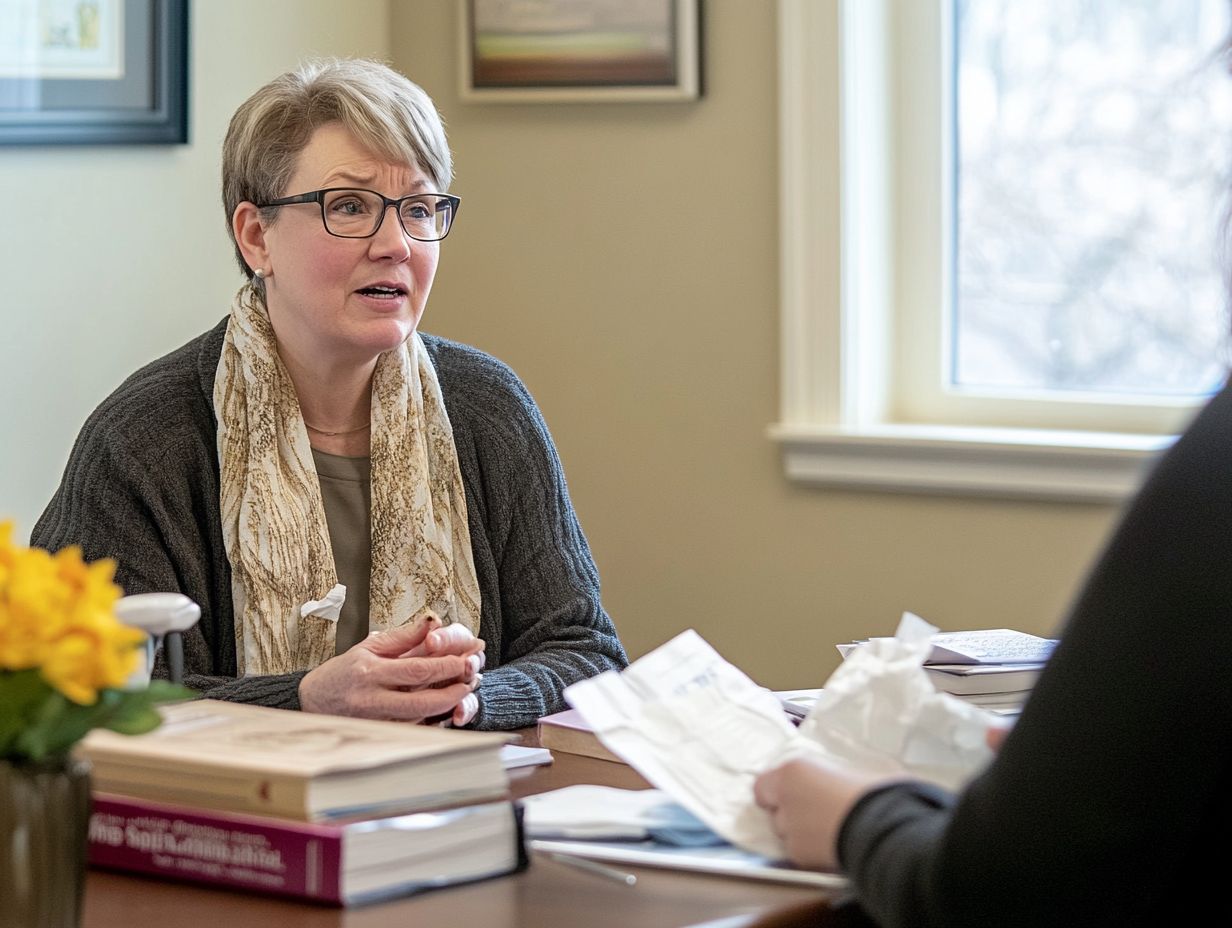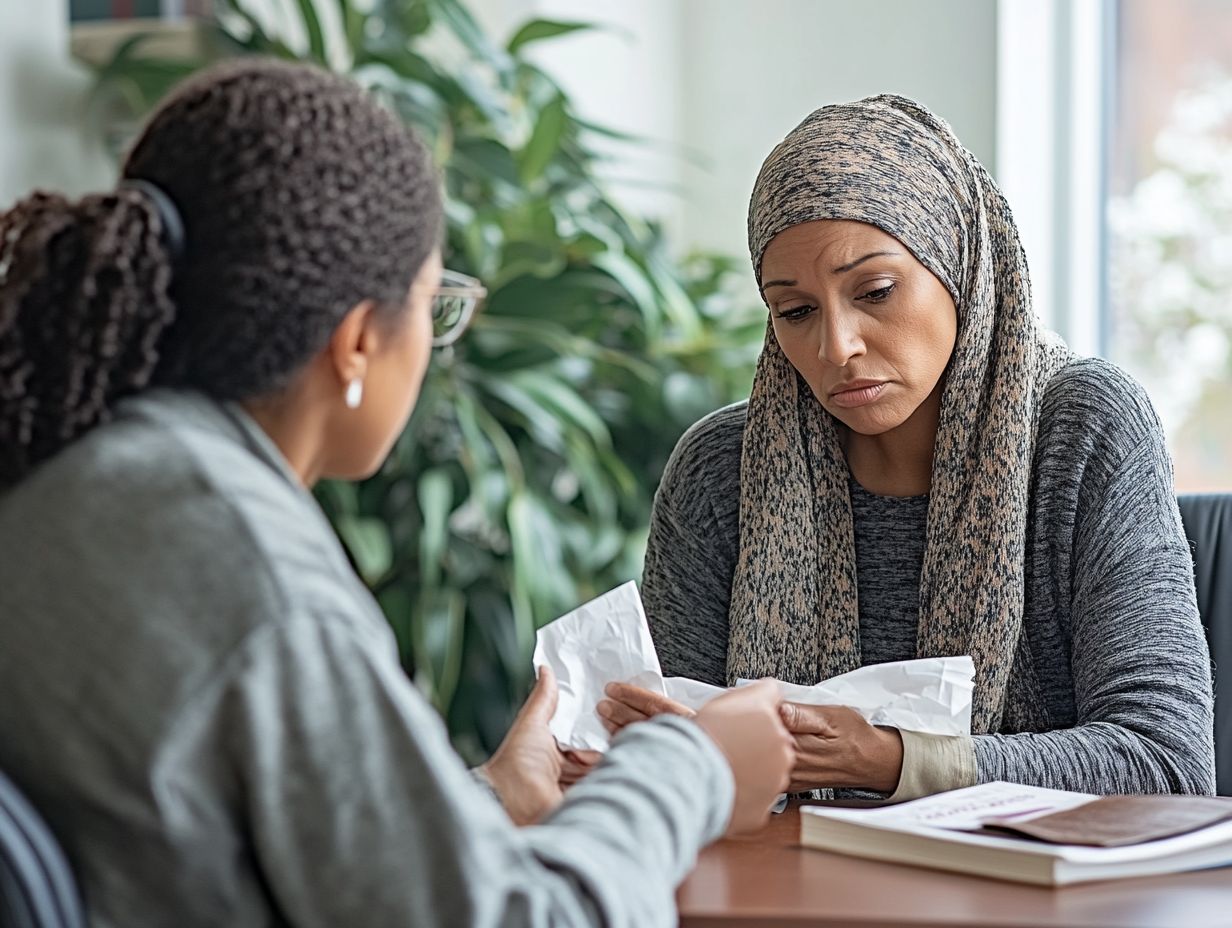Accessing affordable counseling for cancer patients is crucial in managing the emotional and mental health challenges that accompany a cancer diagnosis. Counseling services provide vital support through mental health professionals like psychologists and oncology social workers, helping cancer patients cope with fear, anxiety, and depression, and improving their overall quality of life through stress management and specialized programs.
Various affordable options are available for cancer support, including:
- non-profit organizations and community resources
- community mental health centers
- online therapy platforms
- support groups
These community resources often offer sliding-scale fees, low-cost services, or even free peer-to-peer support, making mental health care accessible for cancer patients in need.
Understanding insurance coverage and navigating policies effectively can further reduce out-of-pocket expenses for counseling. Additionally, ensuring the selection of a qualified counselor with experience in cancer care is essential for tailored support. Patient navigators can assist in this process. For those supporting a loved one with cancer, providing practical and emotional assistance, including caregiver support and family support, can significantly enhance their well-being during this challenging time.
Key Takeaways:
1.
2.
3.
4.
5.
6.
Understanding the Need for Counseling in Cancer Patients

Counseling for cancer patients addresses emotional and mental health challenges following a cancer diagnosis, such as fear, anxiety, and depression. These services are part of the broader healing process cancer patients undergo, supported by oncology and health care providers.
Counseling provides support through professionals like psychologists and oncology social workers, aiding in coping and improving quality of life.
The Emotional Impact of Cancer Diagnosis
The emotional impact of a cancer diagnosis includes fear, anxiety, sadness, and anger, affecting mental health and well-being. Support from health care providers and peer support groups can aid in managing these feelings.
Coping strategies such as mindfulness practices, meditation, and strong support networks help individuals manage emotions and foster resilience.
Benefits of Counseling for Cancer Patients
Counseling provides emotional support for cancer patients, helping them manage mental health challenges through behavioral therapy and coping strategies.
Counseling benefits include:
- Reducing anxiety
- Developing coping strategies
- Fostering resilience
Counseling promotes a sense of community and improves overall quality of life for cancer patients.
Counseling enhances survivorship resources and emotional well-being during and after treatment.
Improving Mental Health and Coping Strategies
Improving mental health for cancer patients involves integrating mindfulness practices, cognitive-behavioral techniques, and professional counseling.
Mindfulness practices such as meditation and yoga help reduce stress and anxiety.
Cognitive-behavioral techniques reframe negative thoughts, fostering resilience.
Support from family, friends, and healthcare providers creates a strong emotional support system.
Regular communication with healthcare teams, including clinical social workers and psychiatrists, about mental health ensures comprehensive care addressing both physical and emotional needs.
Affordable Options for Counseling
Affordable options for counseling include:
- Non-profit organizations
- Community mental health centers
- Online therapy platforms
- Support groups
Non-profit organizations often offer sliding-scale fees, while community centers provide low-cost counseling services.
Online therapy platforms may offer reduced rates, and support groups, often free, provide peer support.
Community Resources and Support Groups

Community resources and support groups for cancer patients provide emotional support, information, and peer connections during treatment. These groups, supported by organizations like the American Cancer Society and CancerCare, focus on health and emotional needs by offering peer support, counseling, and workshops.
These groups focus on health and emotional needs by offering peer support, counseling, and workshops.
Organizations like the American Cancer Society and CancerCare offer programs, counseling, and financial assistance for cancer patients.
Local support groups create safe spaces for sharing experiences and advice, fostering understanding and support.
Online Counseling Services
Online counseling services provide mental health support through virtual platforms, allowing individuals to connect with mental health professionals from home. These virtual support services include options like behavioral therapy and stress management techniques.
These services offer flexible scheduling and accessibility, especially beneficial for those in remote areas.
Online counseling includes options like:
- one-on-one therapy
- group sessions
- specialized support groups
Insurance Coverage for Counseling
Insurance coverage for counseling refers to the portion of mental health counseling costs that an insurance policy covers.
Insurance coverage varies by plan and may include full or partial payment for counseling services, often requiring pre-authorization.
Understanding the specifics of an insurance policy is essential to access mental health support with minimal out-of-pocket expenses. Additionally, financial assistance from community programs and cancer support organizations can further help patients.
Navigating Insurance Policies
Navigating insurance policies for cancer patients involves understanding terms like deductibles, copayments, and out-of-pocket maximums to access mental health counseling services.
Cancer patients should review policy documents and prepare questions for insurance representatives about mental health coverage and pre-authorization requirements. Utilizing resources from the National Cancer Institute can aid in this understanding.
Utilizing cancer support organizations helps in understanding claims and maximizing insurance benefits.
How to Find a Qualified Counselor
To find a qualified counselor, start by determining the specific type of counseling needed, such as mental health or career guidance.
- Check credentials and certifications to ensure the counselor is licensed.
- Seek referrals from trusted sources like doctors or friends.
- Verify the counselor’s experience with similar issues.
- Consider a consultation to assess compatibility and approach.
Factors to Consider in Choosing a Counselor

Cancer patients should consider several factors when choosing a counselor: qualifications, experience with cancer care, and therapeutic approach.
Compatibility between the patient and counselor is essential for a trusting therapeutic relationship.
The counselor’s approach should match the patient’s needs, whether it’s cognitive behavioral therapy, mindfulness, or holistic methods.
Availability of specialized cancer support programs is crucial for providing targeted emotional support and resources, enhancing survivorship experiences and fostering a strong support network.
Supporting a Loved One with Cancer
Supporting a loved one with cancer involves providing emotional support, assisting with daily tasks, and ensuring they attend medical appointments.
Emotional support includes listening, being present, and offering reassurance. Practical support involves helping with household chores, meal preparation, and coordinating transportation.
Understanding their medical needs and communicating effectively with healthcare providers is crucial.
Tips for Providing Emotional Support
Providing emotional support to a loved one with cancer involves being present, listening actively, sharing feelings, and offering reassurance. This emotional support is vital in the healing process and can include engaging with health care providers to ensure comprehensive care.
Emotional support works by creating a safe space where the individual can express their feelings without judgment.
Caregivers should validate emotions, acknowledge challenges, and allow the person to lead conversations at their own pace.
This support fosters connection and emotional healing.
Frequently Asked Questions
1. How can I access affordable counseling for cancer patients?
There are various resources available to access affordable counseling for cancer patients. You can start by contacting your local cancer treatment center or hospital to inquire about counseling services offered. Additionally, nonprofit organizations and support groups also offer counseling services at little to no cost.
2. Are there any online options for affordable counseling for cancer patients?

Yes, there are online counseling options available for cancer patients. Many nonprofit organizations and mental health platforms offer virtual counseling services at reduced rates or for free. You can also check with your insurance provider to see if they cover virtual therapy sessions.
3. What financial assistance options are available for cancer patients seeking counseling?
There are financial assistance options available for cancer patients seeking counseling. Some nonprofit organizations and cancer support groups offer financial aid for counseling services. You can also inquire with your insurance provider about coverage for counseling services.
4. Can I receive counseling through my cancer treatment center?
Yes, many cancer treatment centers offer counseling services for their patients. This may include individual therapy, support groups, or other forms of counseling. Be sure to inquire with your treatment center about the availability and costs of these services.
5. Are there any government-funded programs or community programs for affordable counseling for cancer patients?
Yes, there are government-funded programs available for affordable counseling for cancer patients. The National Cancer Institute and the Centers for Disease Control and Prevention offer free or low-cost counseling services for cancer patients and their families. Additionally, organizations like the American Cancer Society and CancerCare provide access to psychologists and psychiatrists, offering emotional support and stress management resources.
6. What should I do if I cannot afford counseling for my cancer diagnosis?
If you are unable to afford counseling for your cancer diagnosis, there are still options available for support. You can reach out to nonprofit organizations, social workers, and clinical social workers who collaborate with support groups that offer free or low-cost counseling services. Additionally, some therapists may offer a sliding scale fee based on your income. It is important to seek support during this difficult time, even if it means seeking free or low-cost options. Virtual support, community programs, and peer support can be vital resources, along with health care providers who specialize in oncology and survivorship, offering guidance on coping strategies and behavioral therapy.





